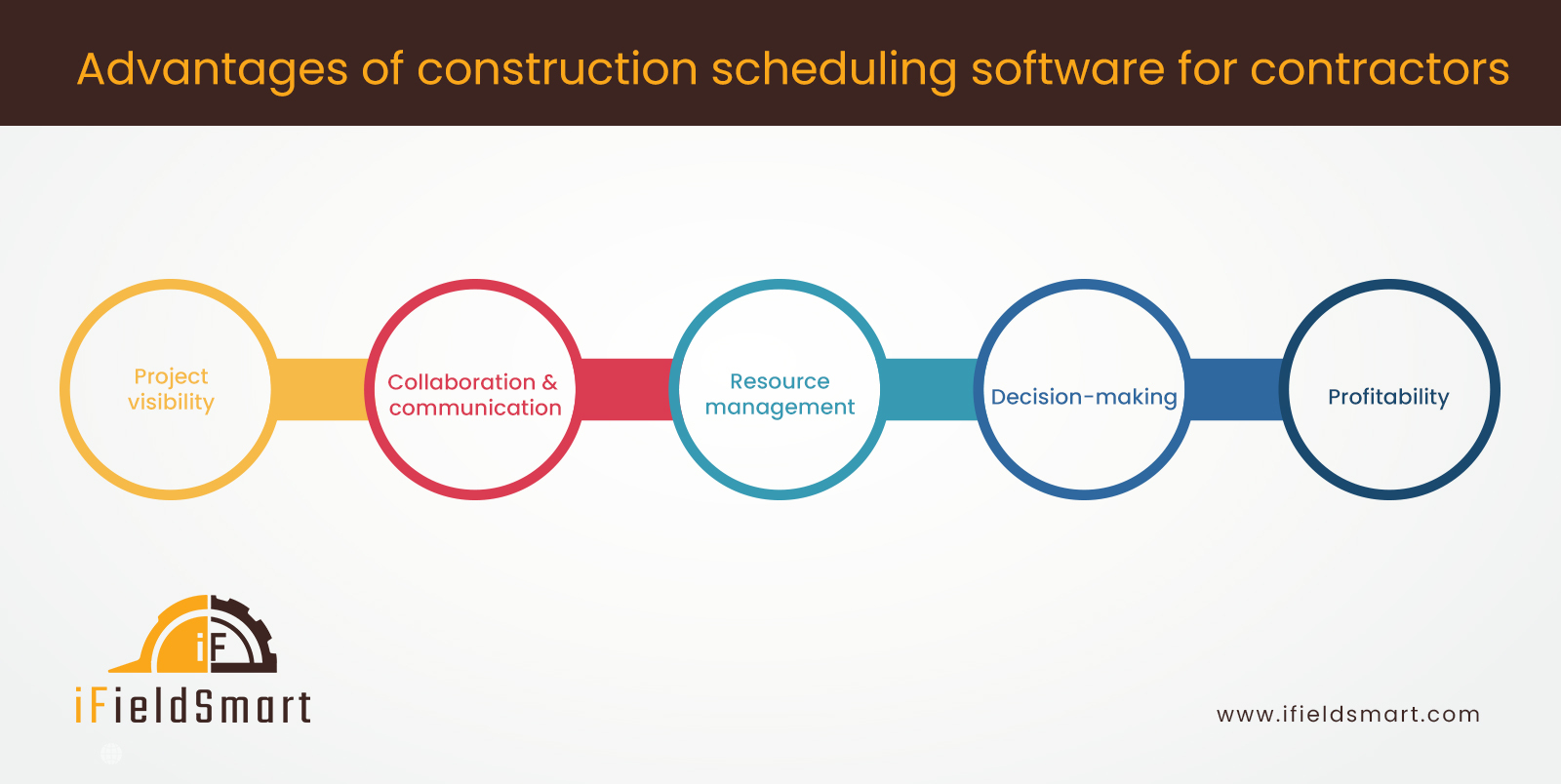
Construction Scheduling Software: An In-Depth Guide for Professionals
Reading Time: 4 minutesIn the complex world of construction, efficient project scheduling is the cornerstone of success. Construction scheduling software has evolved to address the challenges faced by contractors and project managers, offering tools to streamline processes, enhance collaboration, and ensure projects are delivered on time and within budget.
.
Table of Contents
ToggleThe Challenges of Construction Scheduling:
Construction projects are inherently complex, involving numerous stakeholders, intricate task dependencies, and frequent changes. Traditional scheduling methods like Gantt charts and whiteboards often fall short in handling this complexity. Some familiar challenges include:
- Limited Visibility: Lack of real-time insight into project progress makes it difficult to identify bottlenecks and adjust schedules promptly.
- Communication Barriers: Sharing updates and coordinating between teams can be cumbersome, leading to delays and misunderstandings.
- Change Management: Unexpected events like weather delays or material shortages require swift schedule adjustments, often disrupting the entire project timeline.
- Resource Allocation: Balancing resources like labor and equipment across multiple tasks is a constant challenge, impacting both cost and timeline.
.
Benefits of Construction Scheduling Software :
Modern construction scheduling software addresses these challenges by providing:
- Real-time Collaboration: Cloud-based platforms enable team members to access and update schedules from anywhere, fostering collaboration and transparency.
- Visual Project Tracking: Interactive Gantt charts, Kanban boards, and other visual tools offer a comprehensive overview of project progress, making it easier to identify critical paths and potential delays.
- Resource Optimization: Advanced software can help optimize resource allocation based on skillsets, availability, and project requirements.
- Scenario Planning: What-if analysis allows project managers to simulate different scenarios and assess their impact on the schedule, enabling proactive decision-making.
- Mobile Accessibility: Mobile apps enable field teams to access schedules, update progress, and report issues in real time, bridging the gap between the office and the job site.
.
Advantages of construction scheduling software for contractors:

1. Enhanced Project Visibility: Construction scheduling software provides contractors with real-time visibility into every aspect of their projects. They can track progress, identify bottlenecks, and make data-driven decisions to keep projects on track. This transparency empowers contractors to proactively address issues before they escalate, minimizing delays and cost overruns.
2. Improved Collaboration and Communication: Scheduling software acts as a central hub for all project-related information. Teams, subcontractors, and stakeholders can easily access schedules, share updates, and collaborate seamlessly. This streamlined communication reduces misunderstandings, improves coordination, and fosters a more productive work environment.
3. Optimized Resource Management: Efficiently managing resources is crucial for project success. Construction scheduling software helps contractors allocate resources—including labor, equipment, and materials—more effectively. They can identify underutilized resources, optimize schedules to prevent overallocation, and ultimately reduce costs and improve project efficiency.
4. Data-Driven Decision-Making: Construction Contractor Scheduling software often includes analytics and reporting features that provide valuable insights into project performance. Contractors can track key metrics, identify trends, and make informed decisions based on data rather than intuition. This data-driven approach leads to better project outcomes and continuous improvement.
5. Increased Profitability: The cumulative effect of enhanced visibility, improved collaboration, optimized resource management, and data-driven decision-making is increased profitability. By streamlining operations, reducing delays, and minimizing costs, construction scheduling software directly contributes to a healthier bottom line for contractors.
These advantages collectively empower contractors to deliver projects on time, within budget, and with greater efficiency, ultimately enhancing their reputation and competitiveness in the construction industry.
.
Top 5 Construction Scheduling Software :
Here are five leading construction scheduling software solutions, including an in-depth look at iFieldSmart Technologies:
1. iFieldSmart Technologies: This comprehensive platform offers a suite of tools for scheduling, project management, and field collaboration. It boasts features like drag-and-drop scheduling, resource allocation, real-time updates, and customizable dashboards. iFieldSmart’s strength lies in its integration capabilities, seamlessly connecting with popular construction software like Procore and Autodesk Construction Cloud.
2. Procore: Primarily a construction management platform, Procore includes robust scheduling features like Gantt charts, task dependencies, and resource tracking. It excels in document management and project communication, making it a popular choice for large-scale projects.
3. Autodesk Construction Cloud: This cloud-based platform offers a range of tools for scheduling, design, and collaboration. Its BIM 360 module enables clash detection and coordination, while Build provides scheduling features like critical path analysis and resource leveling.
4. PlanGrid: Now part of Autodesk Construction Cloud, PlanGrid focuses on field collaboration, allowing teams to access and mark up drawings, create punch lists, and track issues. Its scheduling features are integrated with other project management tools.
5. Buildertrend: Designed for residential construction, Buildertrend offers a user-friendly interface and features like lead management, client communication, and project scheduling. It’s a good choice for small to medium-sized home builders.
.
Top 10 Frequently Asked Questions (FAQs) :
1. What is the best construction scheduling software for small contractors?
iFieldSmart Technologies is often a good fit for smaller contractors due to its ease of use and focus on residential construction.
2. How does construction scheduling software handle change orders?
Most software allows for easy schedule adjustments, often with features like change order tracking and impact analysis.
3. Can construction scheduling software integrate with accounting systems?
Many platforms offer integrations with popular accounting software like QuickBooks, streamlining invoicing and financial management.
4. Is construction scheduling software only for project managers?
No, the software benefits all team members, from field workers who can update progress in real time to subcontractors who can coordinate their schedules.
5. What is the learning curve for construction scheduling software?
The learning curve varies depending on the software’s complexity. Many providers offer training and support to help users get up to speed quickly.
6. Is construction scheduling software suitable for all types of construction projects?
Yes, there are construction scheduling app & software options for various construction sectors, including commercial, residential, industrial, and infrastructure projects.
7. How does construction scheduling software help with risk management?
The software allows for scenario planning and what-if analysis, helping project managers identify and mitigate potential risks.
8. Does construction scheduling software improve communication and collaboration?
Yes, cloud-based platforms facilitate real-time communication, document sharing, and task coordination, enhancing collaboration among team members.
9. Can construction scheduling software be customized to fit specific workflows?
Many platforms offer customization options, allowing users to tailor the software to their unique needs and processes.
10. What are the cost considerations when choosing construction scheduling software?
Costs vary depending on the software’s features, the number of users, and the chosen subscription plan. Some providers offer free trials or demos to allow users to evaluate the software before committing.
.
Conclusion :
Construction scheduling software has become an indispensable tool for modern construction projects. By addressing the complexities and challenges of scheduling, it empowers project teams to deliver projects on time, within budget, and with greater efficiency. When choosing a solution, consider your specific needs, project types, and budget to find the best construction scheduling software that best aligns with your goals.
Visit: www.ifieldsmart.com/scheduling
You may also like
Recent Blog Post
- Best construction document management software solutions for 2025
- Revolutionizing Construction Inspections: The Power of Construction Inspection Software
- Centralized Communication and Collaboration: The Backbone of Construction Project Management
- From RFIs to Drawings: How iFieldSmart Powers Procore Workflows for End-to-End Construction Management
- Beyond Basic Sync: How iFieldSmart Supercharges Procore & Autodesk Workflows for Smarter Construction Management
Work Smarter, Not Harder
iFieldSmart empowers your team with AI-driven efficiency to simplify scheduling, boost collaboration, and keep projects on track — with human support every step of the way.
